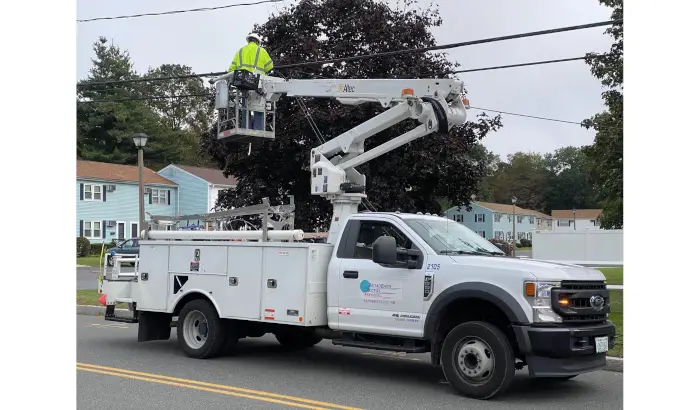Massachusetts lawmakers are considering legislation that would reexamine harsh and mandatory prison sentences. The policy, which follows national trends, could have a significant impact on more than 1,800 people behind bars and their families.
In a historic hearing of the Joint Committee on the Judiciary at the State House last week, 27 prisoners from five institutions testified before Massachusetts lawmakers. More than half advocated for An Act for Second Look, a new bill filed by Rep. Russell Holmes and Sen. Liz Miranda.
It was the latest event in a long-running campaign by advocates and legislators. A week before the Sept. 26 hearing, some 100 people rallied on Beacon Hill to bring attention to harsh sentencing and to promote bills such as Second Look. Among those who spoke at the rally, Second Look sponsors Holmes and Miranda emphasized the disparate effect of mandatory sentences and other harsh sentencing on Black and brown people, with 1,018 or one in five Mass prisoners serving life without parole eligibility or LWOP.
Second Look would offer hope in many of those situations. The effort to pass such a bill in Massachusetts piggybacks on legislation passed in 2021 affecting residents of Washington DC. That law permits those who committed crimes under age 25 to petition for resentencing after 15 years behind bars. As the DC nonprofit the Sentencing Project noted in its 2021 report, A Second Look at Injustice, lawmakers in 25 states were inspired by the DC legislation and are now considering Second Look bills. The proposals differ across the country, with some aimed at those who committed crimes as emerging adults, and some looking to free the elderly, which in prison is defined as over 55 years (i.e. those who have served decades behind bars).

In the Bay State, those under 25 would be in the Second Look cohort, per the current proposed bill. The opportunity for resentencing would mean that the petitioner would go back before the original judge who sentenced him or her and request a “second look” at their sentence. If that judge is not available, the petitioner would appear before another judge in the same court. Successful petitioners would then need to see the Parole Board and prove their incarceration record makes them safe to be released into the community under supervision.
Using data compiled for this article, a BINJ analysis put the current Parole Board’s rate of positive parole votes for those serving a life sentence at 54.6%, higher than under previous boards. Even with second chance opportunities, though, those facing the board would not be guaranteed release. The accompanying chart spells out the Mass bill.

Speaking out for second chances
Since Maura Healey became governor, incarcerated men and women in Massachusetts have been allowed to testify virtually at legislative hearings. On Sept. 26, because they were tuned in at various institutions awaiting their turn, many were also able to hear others speak to legislators about these issues.
James Freeman III said he came to prison when his son was five. Now his son has a 12 year old son. About Second Look, he said, “If a petitioner is able to show the judge that they have really changed, the judge can grant them a hearing; if not, the judge can deny it. But even in the denial, the judge will have the authority to be able to set requirements to help that petitioner become better. That’s America. Even when you make grave errors … no human being should be given up on.”
The State House hearing room was packed, with people waiting to testify on 55 bills. Freeman got nods and applause throughout his testimony; he concluded, “When someone looks to better themselves and evolves by studying and expanding their mind, it moves them into this ray of sunshine. [They] should never be left to the darkness of a prison cell when they have the positive potential to affect the world.”

Julia Enright, who is incarcerated at MCI Framingham, echoed Freeman: “This would be a tool to judge people on their progress, their behavior, which is exactly what prison and parole are supposed to do. … If a person is denied, the court gives them an objective criteria to meet. Prove yourself, who are you, can you do it? This is brilliant because thus far, it’s non-existent. Parole is supposed to do this, but it doesn’t.”
In Massachusetts, those seeking parole for life sentences get positive or negative votes in a written decision some months after they see the Parole Board. The current board typically issues decisions in two to four months. Advocates say that is a vast improvement from the previous two boards. But according to a 2022 report from the Lifer’s Group at Norfolk MCI, for the past several years, in its written decisions, Parole Board members have given “little or no guidance to denied lifers as to which program(s)” they should complete prior to their next parole hearing.
Among those who testified in person on Beacon Hill last week, Daniel Throop said he sees change in people every day. Now executive director of the National Prison Debate League, which he founded, Throop spent 20 years behind bars. He told the joint committee: “Personal accountability is important, but so is system accountability. We have a correctional facility that doesn’t promote, facilitate, or recognize human change. … When do we hold our systems accountable for supporting that change?”
The pushback
While no one testified against the bill during the six-plus hour hearing, according to the nonprofit news organization The Appeal, “Opponents of early releases insist that people imprisoned for violent crimes, no matter their age at the time the crimes were committed, will likely re-offend if they are freed, and should carry out their full sentences.” Federal prosecutors concur, and have claimed that such laws free “dangerous criminals” and deny victims a “sense of finality.”
In a major study done by the Alliance for Safety and Justice, 61% of those who identified as crime survivors preferred that those responsible for acts of violence serve “shorter prison sentences.” And the survivors recommended that more spending go to “prevention and rehabilitation” rather than to “long prison sentences.”
Before the law for DC residents was approved in 2021, there was dispute over who should be eligible for Second Look. A Washington Post op-ed opposed Second Look for those older than 17, suggesting the brutality of the offense be taken into consideration. However, the DC law ultimately reflected evolving brain research. According to the National Institute of Mental Health, “the brain continues to mature even after an individual reaches the legal age of majority. In fact, studies suggest that brain development continues into one’s mid-to-late 20s”—and that the vast majority of people age out of violent behavior.
Supporting research
Sarah Staudt, an advocacy and policy director with Prison Policy Initiative, a nonprofit research group based in Easthampton, noted that Massachusetts has the highest percentage of men and women serving LWOP of any state in the nation. She said, “While we have done a great job of getting people out of prison [with lesser charges]…we can’t decrease the harms of mass incarceration unless we address people with higher and more serious charges.” Staudt considers Second Look a “pathway to release.”
More than 200,000 people are serving life sentences across the United States. In Massachusetts, per the Department of Correction (DOC), as of 2022, 1,851 had life sentences, which is one-third of the state’s prison population (1,018 of those are serving life without parole). At $128,804 per person (according to an average of the DOC’s reporting on per prisoner cost at 14 institutions), Massachusetts spends millions housing its 1,018 LWOP prisoners each year.

Nazgol Ghandnoosh, co-director of research at the Sentencing Project, testified virtually, stating, “Nationwide, nearly one in every five people in US prisons have already served at least 10 years, based on data from 2019. In Massachusetts, the rate was even higher, with nearly one-quarter of the prison population having served at least 10 years.” She added, “Criminological research establishes that lengthy sentences are at odds with best practices for advancing public safety.”
About racial disparities, Ghandoosh said, while Blacks are “vastly over-represented in the prison population, this disparity widens among those serving lengthy sentences.” Adding, “In 2019, Black Americans represented 14% of the total U.S. population, 33% of the total prison population, and 46% of the prison population who had already served at least 10 years.”
Along with Ghandoosh, senior Second Look campaign strategist Alexandra Bailey and Warren Allen, a campaign fellow and Second Look recipient, spoke in favor of the bill. Allen, who was sentenced to life, said he had been considered “beyond repair.” He served 22 years and when Second Look was passed in DC, he was one of its first recipients.
He said, “I am here on behalf of nearly 200 people released on Second Look. We are violence interrupters, elected officials, youth mentors, and key staffers fighting for a better city and world. … Second Look is for those who have put in decades of hard work to better themselves.”
For the bill to advance, the Joint Committee must vote to recommend it by early February 2024.





